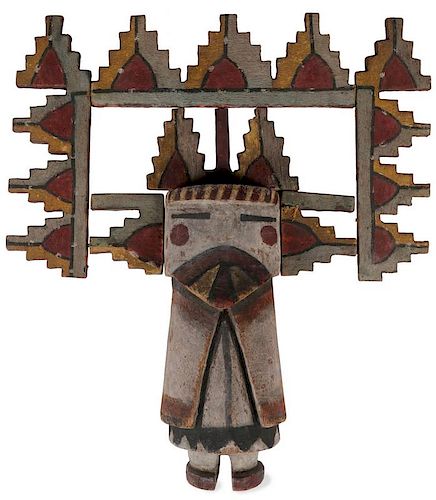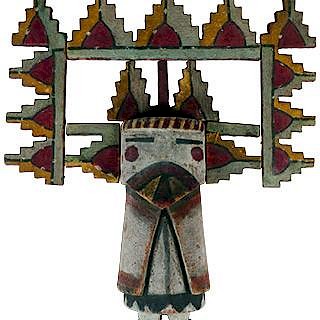AN EARLY HOPI POLYCHROME WOOD KACHINA DOLL
About Seller
2229 Lincoln Street
Cedar Falls, IA 50613
United States
Founded in 1969, Jackson’s International Auctioneers and Appraisers has grown to become one of the nation’s premier service providers for the sale and appraisal of antiques and fine art. Our regularly scheduled auctions bring to market a broad array of objects, including Russian icons, Old Master pa...Read more
Two ways to bid:
- Leave a max absentee bid and the platform will bid on your behalf up to your maximum bid during the live auction.
- Bid live during the auction and your bids will be submitted real-time to the auctioneer.
Bid Increments
| Price | Bid Increment |
|---|---|
| $0 | $10 |
| $100 | $25 |
| $500 | $50 |
| $1,000 | $100 |
| $2,000 | $200 |
| $5,000 | $500 |
| $10,000 | $1,000 |
About Auction
Apr 24, 2018 - Apr 26, 2018
Jackson's International Auctioneers and Appraisers accounting@jacksonsauction.com
- Lot Description
AN IMPORTANT EARLY HOPI POLYCHROME WOOD KACHINA DOLL, DEPICTING A SHALAKO MANA, CIRCA 1900. Traditionally depicted wearing a white manta across her shoulders and a case mask, with hatched rainbow on the chin, red circles on cheeks, rectangular eyes set wide apart and overhanging brow line, surmounted by an elaborate openwork tablita, carved and painted with raincloud motifs, held together with wood peg and cotton string. Greatest height 14.75 inches (37.5 cm). Greatest width 13 inches (33 cm). The tablita unassembled and not attached to body, but complete.
Provenance:
Sold on behalf of the Washington, Iowa Public Library to whom the offered lot along with a collection of other similar Native American items offered on this auction was donated in 1964 to the library by Mrs. Emily Powis Simpson-Atmore (1882-1968).
It is believed that the offered lot as well as the others consigned by the library to this auction came into the possession of Mrs. Simpson-Atmore through her association and wide ranging travels of her husband the Rev. William Smith Simpson-Atmore (1863-1943). William Smith Simpson-Atmore was born in Cape Town, South Africa on July 5, 1863, and was raised and educated in Hingham, Norfolk, England. In 1884, at the age of 21, he moved to United States where he attended Seminary at The University of the South, Sewanee, Tennessee. In June of 1888, he was ordained an Episcopalian priest by Bishop Edwin Gardner Weed (1846-1924). In May of 1889, he married Anne Howze Milton (1859-1920), the daughter of former Florida Governor John Milton (1807-1865). In 1920, Rev. Simpson-Atmore's wife, Anne, died. Two years later, he remarried British native, Emily Powis Cotton, who donated the offered lot and others to the Washington, Iowa Public Library in 1964.
Rev. William Smith-Atmore traveled widely and was pastor, rector, superintendent and warden at a variety of Episcopal Churches and institutions in the United States including: Church of the Good Shepherd Jacksonville, Florida, 1890-1898, St. Lukes, Kearney, Nebraska, circa 1899-1900, Trinity Episcopal Church, Hattiesburg, Mississippi, 1911-1921, and Helen Dunlap Memorial School For Mountain Girls (Warden), Winslow, Arkansas, circa 1922-1938. Simpson-Atmore was also, at one time, the U.S. Episcopalian Secretary for the Propagation of the Gospels in the United States. Furthermore, his ordaining bishop (Edwin Weed) was known as the missionary bishop; as over 77 missions were founded during his episcopate. Little is known about his whereabouts during the period of 1900-1910, roughly the period in which the donated artifacts would all seem to date. A group of 11 albumen print photographs (lot #21 in this sale) would seem to date to this time period as well and depict various scenes of the Arizona Territory with period inscriptions on verso. One of the photos, which is inscribed as "Apache woman in front of Trading Post-Whiteriver Agency, Arizona", also depicts a white man in attire typical (hat and bow tie) of a gentleman circa 1900. Based on a known photograph of Rev. William Smith Simpson-Atmore, it is plausible that the figure depicted is him. It is not difficult to presume then that with his background as Secretary for the Propagation of the Gospels and the missionary zeal of the day that Rev. Simpson-Atmore would have been drawn to the missionary territory of Arizona (and his wife to the dryer warmer climate). As such, it would seem likely these items were acquired by him while traveling there at that time.
SHIPPING NOTICE:
Jackson's is your sole and only source for one stop packing and shipping. With over 50 years of experience, our professional, affordable and efficient in-house shipping department will be happy to provide you a fair and reasonable shipping quote on this lot. Simply email us before the auction for a quick quote: shipping@jacksonsauction.com or call 1-800-665-6743. Jackson's can expertly pack and ship to meet any of your needs. To ensure quality control Jackson's DOES NOT release to third party shippers. - Shipping Info
-
All successful absentee bidders may request a shipping quote for Jackson’s International to provide shipping to be sent with their invoice. This shipping quote includes the cost of standard shipping as well as charges for materials and labor. Please indicate any special shipping instructions on the bid form. Purchases paid by personal check will not be shipped until funds have cleared Auctioneer's bank. Please note that International shipping is not available for ivory items. These items will only be shipped within the United States, except to California, Connecticut, New Jersey, and New York. All buyers agree to comply with any additional restrictions regarding the trade of endangered species as a condition of sale. It is the purchaser’s responsibility to obtain any licenses and/or certificates as well as any other required documentation prior to shipment. In the case of denial or delay of any required documentation or paperwork, they buyer will still be responsible for making on-time payment for the total purchase price of the lot. Therefore, if you are unsure, Jackson’s recommend that you DO NOT BID on ivory items. We support the ban on the sale of non-antique carved ivory objects of art.
-
- Buyer's Premium



 EUR
EUR CAD
CAD AUD
AUD GBP
GBP MXN
MXN HKD
HKD CNY
CNY MYR
MYR SEK
SEK SGD
SGD CHF
CHF THB
THB














